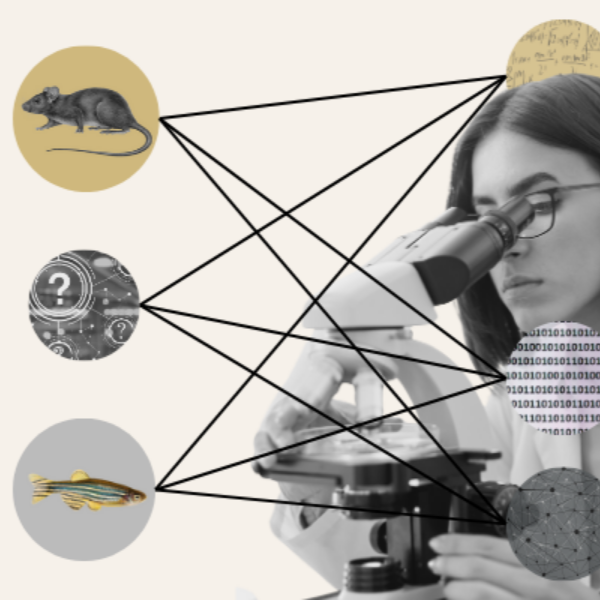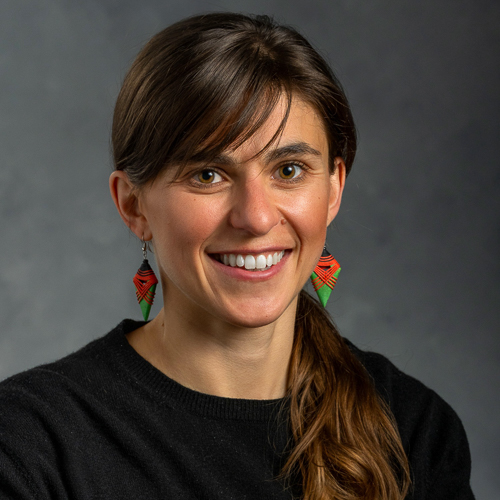Taking the Long View: Integrative Biology Graduate Students Win Prestigious Fellowship
Three Integrative Biology graduate students were among 11 MSU graduate students recently awarded Kellogg Biological Station (KBS) Long-Term Ecological Research (LTER) program fellowships. Isabela Borges, Lindsey Kemmerling, and Corinn Rutkoski will participate in the program.
Established by the National Science Foundation in 1980, the National Network of LTER sites provides funding and support for long-term, ecological studies across 28 sites in the United States. The KBS site, established in 1988, currently engages in research on ecology and environment across a gradient of land-use intensity from conventional field crops to grasslands.
Each student will be awarded funds for one semester totaling $6,500 to be used for stipend, tuition, health insurance, and research-related expenses.
Isabela Borges, a first-year Ph.D. student advised by biologist Sarah Fitzpatrick, has been looking forward to working at KBS since the start of her program. Her fellowship begins in the spring of 2020.
“I am energized to get this fellowship,” Borges said. “Knowing that I’ll be supported through the LTER network and surrounded by amazing scientists at this long-term research facility makes everything more exciting.”
Isabela's research will focus on how the legume Chamaecrista fasciculata’s genetic diversity alters its interaction with symbiotic, nitrogen-fixing bacteria. By using LTER soils with different legacies of fertilization, Borges will gain insight into how human-based changes to the environment alter the evolution of natural populations, a study only possible at sites with long histories of research, such as KBS-LTER.
“Understanding how global climate change impacts natural populations will be biologists’ most pressing challenge in coming years,” Isabela said. “This fellowship will cover the equipment needed for my experiments and lighten my teaching assistant load to allow me to focus more time on my research.”
“I am delighted that Isabela received this award and am excited for her to join the impressive team of LTER-affiliated researchers,” said Sara Fitzpatrick, IBIO assistant professor in the Department of Integrative Biology and a KBS faculty member. “Isabela’s project will help advance our understanding of how ecology and evolution interface to affect the performance of species we care about.
“We are at an exciting time in the genomics era to finally be able to explore these interactions with a new level of clarity,” Sara added.
Lindsey Kemmerling, a second-year Ph.D. student, was bolstered by news of the fellowship.
“Receiving support from scientists I admire is validating as a young scientist, and I am grateful that the LTER finds my research important and exciting,” said Lindsey, whose fellowship will begin in fall 2019. “Working as a part of the LTER allows me to explore more impactful questions than I have the capacity to do on my own.”
The funds will make it possible for Lindsey to extend her research on the role of biodiversity in farming systems to the end of the flowering season, an important and exciting time for ecological change she does not want to miss.
“In order to prevent the loss of biodiversity, adapt to climate change and sustainably support a growing population, biodiversity must be incorporated into working landscapes such as farms,” Lindsey said. “The addition of prairie strips at KBS-LTER provides an excellent experimental setup for me to test how increasing biodiversity compares to other methods of farming.”
“I am thrilled that Lindsey was recognized for her potential contribution to KBS-LTER,” said Nick Haddad, IBIO professor, KBS senior terrestrial ecologist and Kemmerling’s advisor. “The award will be a great boost to Lindsey’s graduate research carrying out novel studies of natural areas and their effects on nearby crops and to test landscape conservation’s effects on soil health, pollination, and biodiversity.”
Corinn Rutkoski, a first-year Ph.D. student in biologist Sarah Evans’ laboratory, is investigating soil microbial dynamics associated with prairie strips, a conservation agriculture practice that involves planting strips of prairie grasses and wildflowers within farm fields.
“Prairie strips may facilitate the spread of beneficial bacteria and fungi out into surrounding crop fields,” said Corinn, whose fellowship will cover the fall 2019 semester. “To understand these dynamics, I will collect soil at increasing distances from a prairie strip and assess the composition and activity of soil microbes and various metrics of soil health.”
The fellowship will fund a large portion of sample analysis needed for Rutkoski’s project, including the cost of DNA sequencing to evaluate soil bacterial and fungal community composition.
“Receiving this fellowship means that I can collect valuable baseline measurements from a new treatment in the KBS-LTER site,” Corinn said. “The fellowship also provides me a unique opportunity to begin research and sample analysis early in my graduate career.”
“I’m thrilled that Corinn received this fellowship to work on the LTER,” said her advisor, Sarah Evans, an assistant professor with joint appointments in the Departments of Integrative Biology and Microbiology and Molecular Genetics, and a KBS faculty member. “Corinn is interested in how we can use prairie and perennial plants to diversify agricultural fields, an exciting area of research because work so far suggests planting parts of farm fields in perennials can be a win-win for the farmer and ecosystem services.”
Two of the KBS-LTER fellows, Lindsey and Corinn, are also using part of their fellowship funds to team up this summer. Kemmerling will investigate decomposition by dung beetles, while Corinn looks at microbial-related decomposition. By pairing their research, the graduate students will have an even wider snapshot of soil health and biodiversity across different agricultural management practices and soil trophic levels.
To find out more about KBS-LTER funding opportunities and previous fellowship award winners, please visit: https://lter.kbs.msu.edu/get-involved/grants-and-fellowships/.



